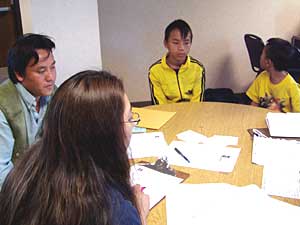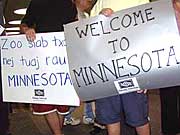| The Hmong in Minnesota |
|
Audio
Photos
Your Voice
|
Hmong children enroll in school
June 25, 2004
 |
| Sou Seng Xiong, left, fills out paperwork to enroll his sons in the St. Paul school district in the fall. Xiong and his family arrived in the Twin Cities on Monday from a refugee camp in Thailand. (MPR Photo/Toni Randolph) |
St. Paul, Minn. — The St. Paul public schools were ready for Sou Seng Xiong when he arrived Friday morning with two of his sons, age 15 and 11, and their case worker. They were greeted at the door of the student placement center on University Ave.
Dana Abrams coordinates the enrollment process at the center. She asked the family to check in at the reception area so that they could begin filling out paperwork.
"This is a process we go through with all of our families. So you're doing exactly what everyone else new to the district would be doing," Abrams told Xiong.
The case worker acted as a translator, but the placement center also assigned a Hmong-speaking staff member to process the family. Most of the 5,000 refugees expected to arrive in the Twin Cities from Thailand speak little or no English. Abrams says St. Paul tries to make the enrollment process as user-friendly as possible for the families.
 | |||
In fact, the district has produced a video that explains how parents can enroll their children in school. It's narrated in Hmong. The video has been distributed to dozens of Hmong community organizations to assist the new arrivals. But Abrams says the process for the Xiongs and the other refugees is routine.
"The only thing different is the actual school assignment. And that's that the families coming from the refugee camp will be assigned to a T.L.C.," Abrams said.
A T.L.C. is a transitional language center. The district set up three such centers specifically for the newly-arriving Hmong students. There are 150 slots. But since St. Paul is expecting anywhere from 500 to 1,500 new Hmong students, that won't be enough space. So the district expanded its high school language academies to include seventh and eighth graders.
Other students will be assigned to English language learning programs. District officials say they're prepared to adjust any of these programs to accommodate the new students.
Before students can attend any classes, they must have a health assessment. All of the refugees living at the camp outside Bangkok were vaccinated last month by the U.S. State Department for a variety of infectious diseases, including chicken pox, measles and hepatitis B. But Jeanne Sedgewick, the head nurse at the placement center, says there is other health screening that needs to be done.
"They will get the height, weight, vision and hearing (screening). And when they're done with that, we'll also be reviewing the immunization status," Sedgewick said. "Because they're coming from a country at high risk for tuberculosis, we'll also review those pieces. Now with this particular group, they will be going on for refugee clinic assessment."
If those assessments find other health problems that may interfere with the children's education, the district will help the family get medical assistance. During the assessment, they discuss options for families who don't have health insurance.
For the Hmong refugees, the district says it will rely heavily on the sponsoring families and the refugee resettlement agencies for assistance. Once the health assessment is completed, the students are ready for school.
|
News Headlines
|
Related Subjects
|

